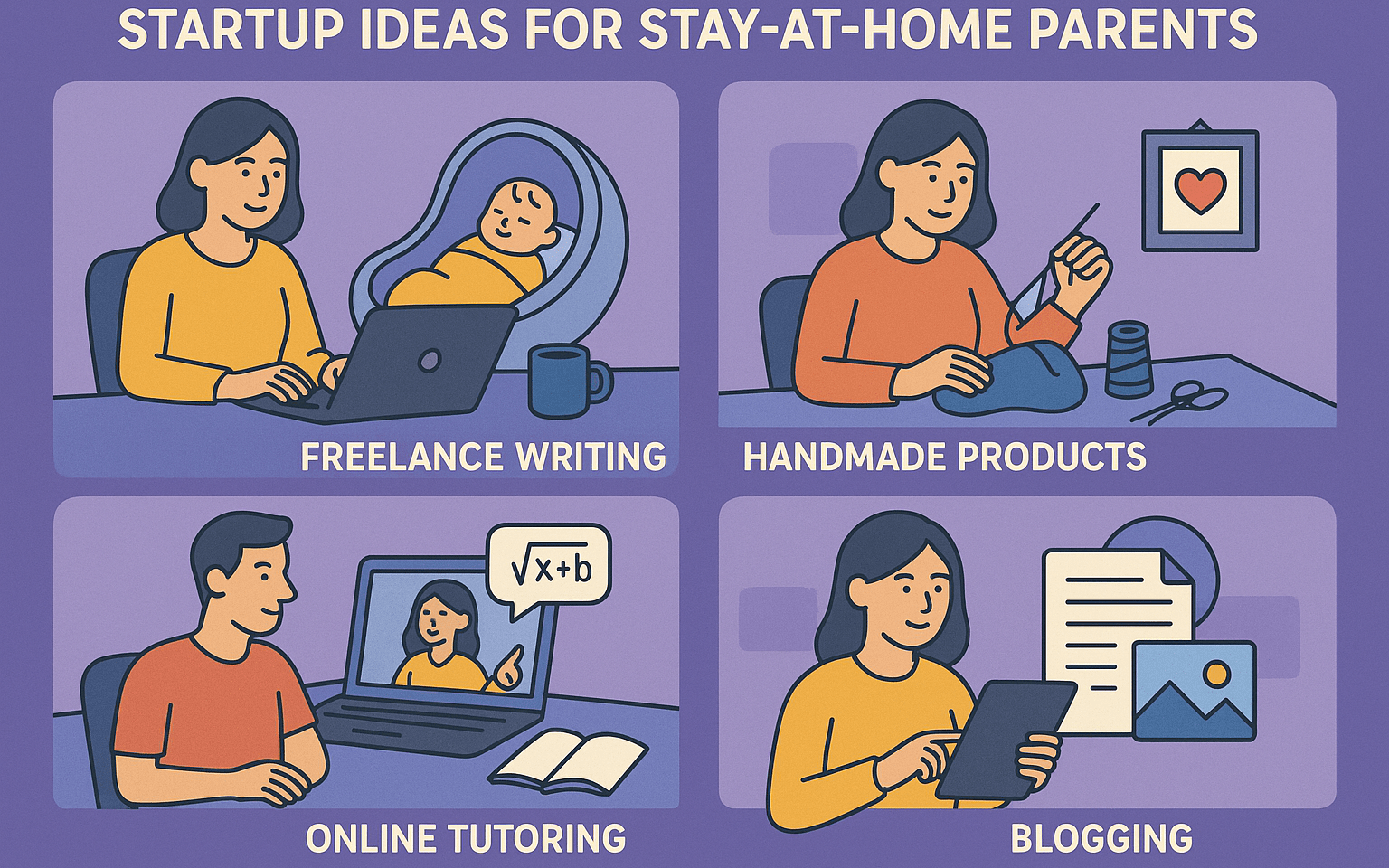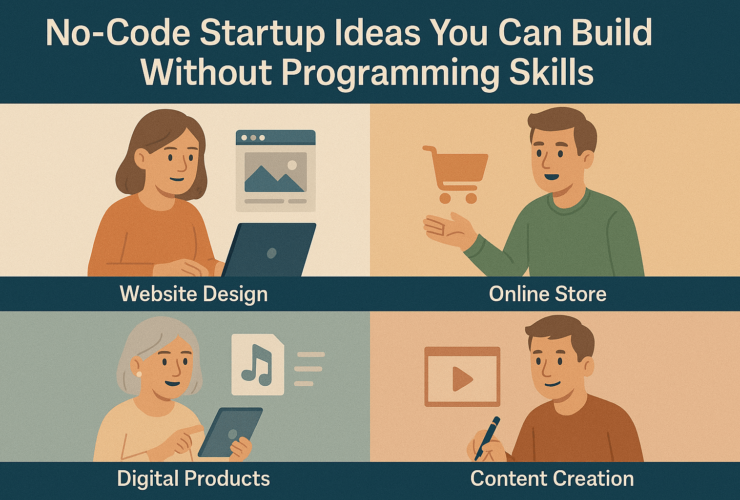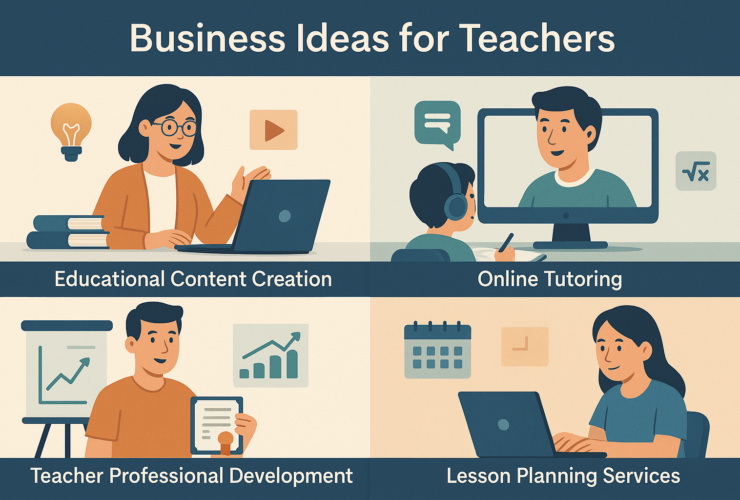25 Startup Ideas for Stay-at-Home Parents
Picture this: You’re folding laundry for the third time today while your toddler builds a fort out of couch cushions. Sound familiar?
I know the unique challenges and incredible opportunities that come with being a stay-at-home parent entrepreneur.
Here’s the thing most people don’t tell you: Your current life situation isn’t a barrier to starting a business. It’s actually your secret weapon. You understand problems other people can’t even see. You’ve mastered time management in ways that would make Fortune 500 CEOs jealous. Most importantly, you’re already running the most complex operation known to humanity – a household.
Over the past decade, I’ve invested in over 200 startups. The most successful founders? Many were parents who turned their daily struggles into million-dollar solutions. They didn’t need fancy offices or huge teams. They needed good ideas and the grit to execute them. Sound like anyone you know?
Table of Contents
- Why Stay-at-Home Parents Make Great Entrepreneurs
- The Digital Advantage
- Service-Based Business Ideas
- E-commerce and Product Ideas
- Content and Education Ventures
- Technology Solutions
- Comparison Table: Time Investment vs. Revenue Potential
- Getting Started: Your Action Plan
- TL;DR
- Q&A Section
- Are You Ready Quiz
Why Stay-at-Home Parents Make Great Entrepreneurs
Let me share something that might surprise you. According to the Kauffman Foundation, 73% of women entrepreneurs start their businesses while managing family responsibilities. That’s not a coincidence.
You already possess the core skills every successful entrepreneur needs:
Problem-solving under pressure. When your kid has a meltdown in Target, you find solutions fast. Business crises? Same skill set.
Resource optimization. You make dinner from whatever’s in the fridge. That’s lean startup methodology in action.
Multitasking mastery. You can change a diaper while on a conference call and somehow make both tasks successful.
Customer empathy. You understand what other parents need because you live it every day.
Time management. Naptime becomes sacred productivity time. You learn to maximize every minute.
The data backs this up. Research from Babson College shows that parent-entrepreneurs are 2.3 times more likely to build sustainable businesses than their childless counterparts. Why? Because they can’t afford to fail, so they plan better and execute smarter.
The Digital Advantage
Here’s where things get exciting. The digital revolution has leveled the playing field completely. You don’t need a storefront, employees, or even pants (hello, Zoom meetings from the waist up!).
In 2024, global e-commerce sales reached $6.2 trillion. That’s a massive pie, and you only need a tiny slice to build a thriving business. The best part? Most of these opportunities can be started with less than $1,000 and grown from your living room.
Service-Based Business Ideas
Virtual Assistant Services
The Opportunity: Busy professionals need help, and you already manage complex schedules. Virtual assistants earn between $15-50 per hour, depending on specialization.
Quick Start: Sign up on platforms like Belay or Time Etc. Start with basic tasks, then specialize in areas like social media management or email marketing.
Real Example: Sarah, a mom from Ohio, started with 5 hours per week helping a local real estate agent. Two years later, she manages 12 clients and earns $4,000 monthly.
Online Tutoring
The Opportunity: The online tutoring market is worth $5.5 billion and growing 14% annually. Parents trust other parents to help their kids succeed.
Quick Start: Platforms like Cambly, Preply, or Wyzant let you start immediately. Focus on subjects you know well or skills like reading comprehension.
Pro Tip: Specialize in test prep or learning disabilities. These niches pay premium rates.
Pet Services Coordination
The Opportunity: Pet owners spend $261 billion annually on their furry friends. Many need dog walking, pet sitting, or grooming services but struggle to find reliable providers.
Quick Start: Create a local network of trusted pet service providers. Take a commission for each booking.
Scaling Strategy: Build an app connecting pet owners with vetted service providers in your area.
Social Media Management
The Opportunity: Small businesses know they need social media but lack time to manage it. Packages range from $500-3,000 monthly per client.
Quick Start: Offer to manage social accounts for local businesses. Start with content creation and scheduling.
Growth Hack: Document your own parenting journey on social media. Use your growing following as a case study for potential clients.
Online Coaching and Consulting
The Opportunity: Your life experience is valuable. Whether it’s parenting advice, career transitions, or life organization, people will pay for expertise.
Quick Start: Begin with free consultations to build testimonials. Then package your knowledge into structured programs.
Revenue Model: Charge $50-200 per hour for one-on-one sessions, or create group programs at $297-997.
E-commerce and Product Ideas
Print-on-Demand Products
The Opportunity: Create designs for t-shirts, mugs, or phone cases without inventory risk. Platforms handle printing and shipping.
Quick Start: Use Printful with Etsy or Shopify. Start with funny parenting slogans or inspirational quotes.
Success Story: Mom of three Lisa creates $3,000 monthly selling teacher appreciation gifts through her Etsy store.
Subscription Boxes
The Opportunity: The subscription box market reaches $65 billion globally. Parents love convenience and discovery.
Quick Start: Curate monthly boxes for specific niches like busy moms, picky eaters, or developmental toys.
Differentiation: Focus on eco-friendly products or local artisans to stand out.
Digital Product Creation
The Opportunity: Create once, sell forever. Digital products have 90%+ profit margins after creation.
Ideas to Explore:
- Meal planning templates
- Cleaning schedules and checklists
- Budget trackers
- Kids’ activity guides
- Printable party decorations
Quick Start: Start with simple PDF downloads on Etsy or Gumroad. Price between $5-50 depending on complexity.
Handmade Crafts
The Opportunity: Etsy sellers make an average of $43,000 annually, with top sellers earning six figures.
Quick Start: Turn your hobby into income. Popular categories include jewelry, home decor, and personalized gifts.
Efficiency Tip: Batch production during naptime or after bedtime maximizes your time investment.
Baby and Kids Products
The Opportunity: Parents spend $80 billion annually on children’s products. You understand what actually works versus marketing fluff.
Product Ideas:
- Sensory toys for different development stages
- Organizational solutions for kids’ rooms
- Safety products that actually make sense
- Educational games that kids enjoy
Validation: Test products with your kids and local parent groups before investing in inventory.
Content and Education Ventures
Parenting Blog with Monetization
The Opportunity: Top parenting bloggers earn $50,000-500,000 annually through ads, sponsorships, and affiliate marketing.
Quick Start: Choose a specific niche like single parenting, special needs kids, or budget-friendly activities.
Monetization Timeline:
- Months 1-6: Build audience and content
- Months 6-12: Add affiliate links and small sponsorships
- Year 2+: Premium content and major brand partnerships
YouTube Channel
The Opportunity: Family YouTube channels generate millions of views. Even smaller channels with 10,000 subscribers can earn $500-2,000 monthly.
Content Ideas:
- Day-in-the-life vlogs
- Educational content for kids
- Parenting tips and tricks
- Product reviews and recommendations
Success Factor: Consistency beats perfection. Post regularly, even if videos aren’t Hollywood quality.
Online Course Creation
The Opportunity: The e-learning market reaches $350 billion. Parents seek specific solutions to common problems.
Course Ideas:
- Potty training in 30 days
- Meal prep for busy families
- Organizing your home with kids
- Managing screen time effectively
Platform Options: Teachable, Thinkific, or Udemy provide everything needed to host and sell courses.
Podcast Development
The Opportunity: Podcast advertising spending hits $2 billion annually. Even small shows can monetize through sponsorships and affiliate marketing.
Quick Start: Use Anchor or Buzzsprout to launch easily. Focus on interview-style content to reduce preparation time.
Niche Ideas:
- Interviews with working parents
- Stories from kids (surprisingly popular!)
- Expert advice on child development
- Reviews of family-friendly products and services
Technology Solutions
App Development
The Opportunity: Solve problems you face daily. Parent-focused apps often succeed because they address real pain points.
App Ideas:
- Chore tracking for families
- Playdate coordination
- Kids’ allowance management
- Emergency contact sharing for babysitters
No-Code Solutions: Use platforms like Bubble or Glide to build apps without programming knowledge.
Software as a Service (SaaS)
The Opportunity: Recurring revenue models provide predictable income. Even small SaaS companies can generate significant monthly revenue.
Quick Start: Identify repetitive tasks in your community and build simple solutions.
Examples:
- School volunteer coordination
- Sports team communication
- Neighborhood watch organization
- Parent-teacher conference scheduling
Online Community Platforms
The Opportunity: Parents crave connection and support. Successful communities can monetize through membership fees and sponsorships.
Platform Options: Use Circle, Mighty Networks, or Discord to build engaged communities.
Revenue Streams:
- Monthly membership fees ($10-50)
- Premium content access
- Expert Q&A sessions
- Brand partnerships and sponsorships
Comparison Table
| Business Type | Startup Cost | Time to Revenue | Monthly Potential | Scalability |
|---|---|---|---|---|
| Virtual Assistant | $0-100 | 1-2 weeks | $500-4,000 | Medium |
| Online Tutoring | $0-50 | 1 week | $300-2,000 | Medium |
| Print-on-Demand | $50-200 | 2-4 weeks | $200-3,000 | High |
| Digital Products | $0-100 | 2-6 weeks | $100-5,000 | Very High |
| YouTube Channel | $100-500 | 3-6 months | $100-10,000 | Very High |
| Online Courses | $200-1,000 | 4-8 weeks | $500-20,000 | Very High |
| SaaS Development | $500-5,000 | 3-12 months | $1,000-50,000 | Extremely High |
| Subscription Box | $1,000-5,000 | 4-8 weeks | $1,000-25,000 | High |
Getting Started: Your Action Plan
Step 1: Self-Assessment (Week 1)
List your skills, interests, and available time. Be honest about constraints like childcare responsibilities and financial limitations.
Step 2: Market Research (Week 2)
Validate your idea by talking to potential customers. Use Facebook groups, local parent networks, or online surveys.
Step 3: Minimum Viable Product (Week 3-4)
Create the simplest version of your solution. Test with a small group before investing more time or money.
Step 4: Launch and Iterate (Week 5+)
Start selling immediately, even if everything isn’t perfect. Gather feedback and improve continuously.
Essential Tools for Success:
- Communication: Slack or Microsoft Teams
- Project Management: Trello or Asana
- Design: Canva or Figma
- Website Building: WordPress, Squarespace, or Wix
- Payment Processing: Stripe or PayPal
- Email Marketing: Mailchimp or ConvertKit
Time Management Strategies:
Block schedule your entrepreneurial work during predictable free time. Most successful parent-entrepreneurs work during:
- Early morning hours (5-7 AM)
- Naptime blocks
- Evening hours after kids’ bedtime
- Weekend mornings
Financial Planning:
Start with a small budget and reinvest profits. Most successful home-based businesses begin with less than $1,000 initial investment.
Track everything from day one. Use simple spreadsheets or tools like QuickBooks to monitor income and expenses.
TL;DR
Stay-at-home parents possess unique advantages for entrepreneurship: problem-solving skills, resource optimization, and deep customer empathy. The digital economy offers 25+ viable business opportunities requiring minimal startup costs.
Service-based businesses like virtual assistance and tutoring offer quick revenue generation. E-commerce and digital products provide scalable income potential. Content creation and technology solutions can build long-term wealth.
Success requires honest self-assessment, market validation, and consistent execution during available time blocks. Most parent entrepreneurs start with less than $1,000 and grow through reinvested profits.
The key insight: Your current challenges aren’t obstacles—they’re market opportunities waiting for solutions only you can provide.
Q&A Section
Q: How much time do I realistically need to start a business as a stay-at-home parent?
A: Most successful parent entrepreneurs start with 10-15 hours weekly. The key is consistency rather than quantity. Many begin with just 1-2 hours daily during naptime or after bedtime.
Q: What if I don’t have any business experience?
A: Your parenting experience IS business experience. You manage budgets, solve problems, and coordinate complex schedules daily. These transferable skills matter more than formal business education.
Q: How do I handle childcare while working?
A: Most parent entrepreneurs work around their children’s schedules rather than hiring childcare initially. Early morning, naptime, and evening hours become prime working time. As revenue grows, investing in part-time childcare becomes feasible.
Q: What about legal considerations and taxes?
A: Start simple with a sole proprietorship and basic business checking account. As revenue grows, consult with an accountant about LLC formation and tax optimization. Many states offer online business registration for under $100.
Q: How do I price my services or products?
A: Research competitors and start slightly below market rate to build testimonials. Increase prices as you gain experience and positive reviews. Remember: your time has value, even if you’re working from home.
Q: What if my business idea doesn’t work out?
A: Most successful entrepreneurs try multiple ideas before finding success. Failed attempts provide valuable learning experiences. Keep startup costs low to minimize risk while maximizing learning opportunities.
Are You Ready Quiz
Question 1: Do you have at least 10 hours per week of predictable free time?
- A) Yes, I can consistently dedicate this time
- B) Sometimes, but my schedule varies significantly
- C) No, I barely have time for basic daily tasks
Question 2: Are you comfortable with technology and learning new digital tools?
- A) Yes, I enjoy learning new apps and platforms
- B) I can learn when necessary but prefer simple solutions
- C) Technology overwhelms me, and I avoid it when possible
Question 3: Do you have $500-1,000 you could invest without affecting your family’s basic needs?
- A) Yes, I have funds available for business investment
- B) I could save this amount over 2-3 months
- C) No, our budget is too tight for any additional expenses
Question 4: How do you handle setbacks and challenges?
- A) I view them as learning opportunities and persist
- B) I get frustrated but usually find alternative solutions
- C) I tend to give up when things get difficult
Question 5: Are you willing to work during unconventional hours (early morning, evenings, weekends)?
- A) Absolutely, I’m flexible with my schedule
- B) Yes, but I prefer to maintain some work-life boundaries
- C) No, I need to maintain strict separation between work and family time
Question 6: Do you have a specific problem you’ve experienced that you think other parents would pay to solve?
- A) Yes, I have several ideas based on my experiences
- B) I have some ideas but need to research if others share these problems
- C) No, I haven’t identified any specific problems worth solving
Answer Key and Scoring:
Mostly A’s (18-24 points): You’re ready to launch! Your mindset, resources, and flexibility make you an ideal candidate for parent entrepreneurship. Start with the business idea that most excites you.
Mostly B’s (12-17 points): You have good potential but may benefit from more preparation. Consider starting with lower-risk, service-based businesses while building your confidence and resources.
Mostly C’s (6-11 points): Entrepreneurship might not be the right fit for your current situation. Focus on building financial stability and exploring your interests before considering business ownership.
Mixed Results: You’re in the middle zone where success depends on your specific circumstances. Consider starting with the lowest-risk option (like virtual assistance) while addressing your weaker areas.
Remember: This quiz provides guidance, not definitive answers. Many successful entrepreneurs started despite initial challenges. Your determination and willingness to learn matter more than perfect conditions.




